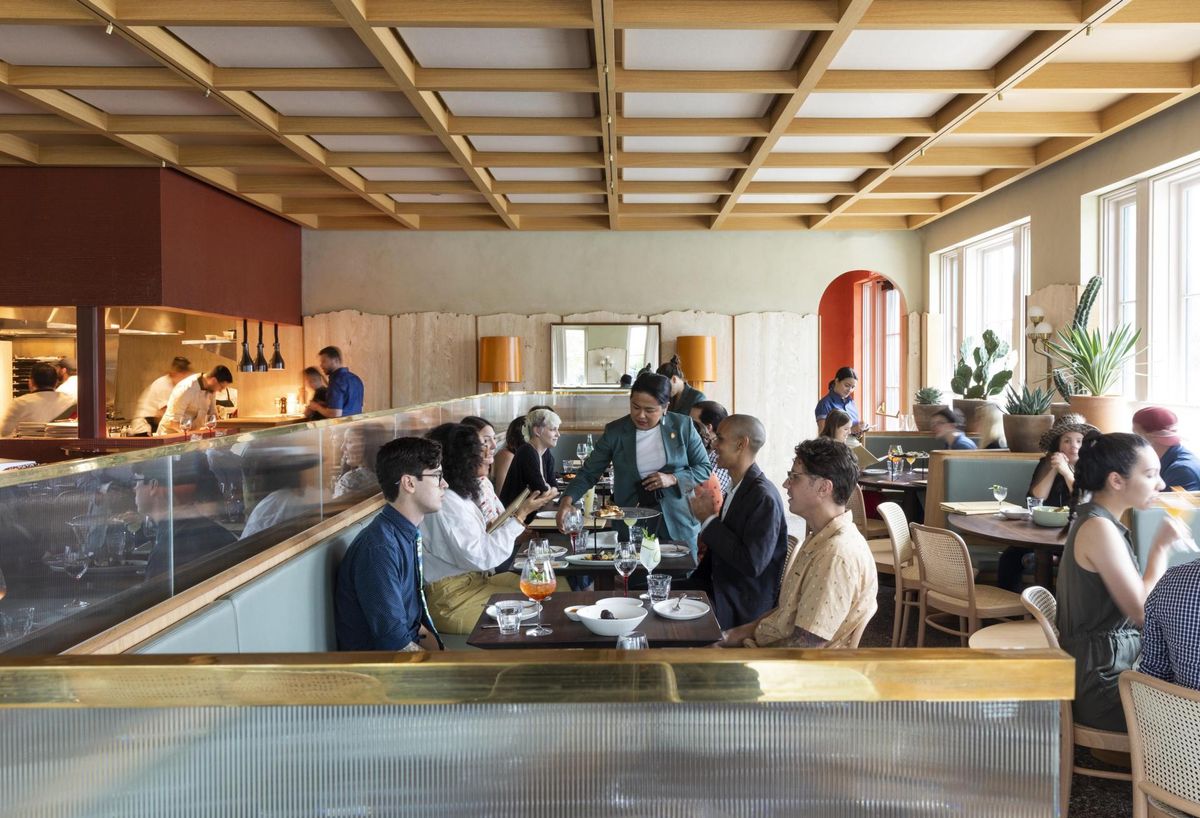Operators of some of Houston’s most successful longstanding restaurants are becoming jaded and unnerved by rent increases and landlords’ lack of transparency.

Courtesy of Zach Horst
Goodnight Hospitality’s Rosie Cannonball in Houston
A successful neighborhood restaurant offers something to a retail or mixed-use property that a monthly rent payment can’t, and it would behoove both parties to work together and find mutually beneficial solutions, panelists said at Bisnow’s Houston Retail and Mixed-Use Event on Tuesday.
“Running restaurants is hard right now,” said Chris Shepherd, a Houston-based chef and founding director of the Southern Smoke Foundation. “Doing real estate is hard too. So if we can both come to the common ground that both of these industries kind of suck right now, maybe we can actually make them better.”
As restaurant operators deal with rising food and labor costs, they also feel encumbered by increasing maintenance fees, surging rents and predatory or misleading lease clauses, panelists said at the event at GreenStreet.
But restaurants can’t exist without a space to operate from. Considering the time they spend finding that perfect place, owners want to make it work.

Bisnow/Maddy McCarty
Rebees’ Matt Ragan, Southern Smoke Foundation’s Chris Shepherd, Goodnight Hospitality’s June Rodil, Johnny’s Gold Brick’s Benjy Mason and Bludorn Restaurant’s Aaron Bludorn.
A lease agreement is akin to a marriage for June Rodil, the CEO of Goodnight Hospitality, which has four restaurant concepts, including Rosie Cannonball and Montrose Cheese & Wine. A lease should be longer than five years, because it takes that long for a restaurant to sink its teeth into a neighborhood, she said.
But if a landlord demands double the rent to match the increase in market value at the end of a decade, that can break the relationship with the restaurant, said Benjy Mason, owner of Johnny’s Gold Brick, Winnie’s and Starduster Lounge.
“The whole thing starts to fall apart, and you see empty spaces all up and down what used to be a busy commercial thoroughfare,” Mason said.
It’s often catastrophic to lose a location that operators spent so long picking out, examining every detail. Mason once passed on an otherwise-ideal lease because it wasn’t possible to turn left into the parking lot.
Only about 51% of restaurants make it past their fifth year of operation. Opening a restaurant anywhere is risky, Shepherd said. But he’s willing to tell a leasing broker to “suck it up, buttercup” and be patient until an acceptable deal comes together.
“I used to always tell this one person who always wanted a lease to be placed, ‘Put your eraser back to that piece of paper, and let’s talk about this again, because there’s no way in hell I’m doing that,’” he said.

Bisnow/Maddy McCarty
Method Architecture’s Katherine Rorie, Midway’s Don Quigley, Downtown Houston+’s Cassie Hoeprich, Market Square Cos.’ Matthew Kelley, the city of Sugar Land’s Devon Rodriguez and Rebees’ Matt Ragan.
Relationships between landlords and tenants are built on trust, so Mason wants clarity about the property owner’s financial structure. Openness and honesty go a long way, he said.
Landlords have charged Mason increased common area maintenance fees annually, and each time he pushes back to ask exactly what the fee pays for. He questions whether it is fair for him to pay promotion fees to a landlord when media often promote his restaurants and, therefore, the landlord’s property.
“Where’s that money being spent?” Mason said. “I know costs are going up, but my costs are going up 5% and yours are going up 15%? Almost every time, I find things and I’m like, ‘This is not appropriate.’”
But expenses are rising on the real estate side of things, too, said panel moderator Matt Ragan, director of retail programming and operations for Rebees. Borrowing and construction costs are up. Land values haven’t dropped because of lenders extending and pretending, keeping values artificially inflated.
“We’re trying to figure out how to make our deals pencil on our side, at the same time that they’re trying to figure it out,” Ragan said.

Bisnow/Maddy McCarty
Waller Economic Development Corp.’s Lynn Spencer, Gin Design Group’s Gin Braverman, Transwestern’s Paula Musa, Concept Neighborhood’s Jeffrey Kaplan, Weitzman’s Sarah Thobae and TAG Restaurant Group’s Troy Guard.
There is undeniable value in having a popular restaurant as a tenant. Putting one of the panel’s chefs in a ground-floor retail spot of an office or multifamily building would drive demand in the real estate above. This would bring vertical value, even at zero dollars of rent, Ragan said.
Successful restaurants used to operate at a 20% net profit margin, but now 10% to 12% is considered pretty good, Rodil said. The national average is 3% to 7%, and it is important for developers to know that.
“We’re not built to make big dollars,” Rodil said. “We’re built to live our dreams and to sustain ourselves. We can eventually do that, and with partnerships with developers … that’s how that happens.”
